Zhu Bajie, also known as Pigsy, is a character from the Chinese novel “Journey to the West.” He is one of the three helpers of the monk Tang Sanzang on his journey to obtain Buddhist sutras from India. Zhu Bajie is a half-human, half-pig creature who is known for his gluttony, laziness, and lustfulness.
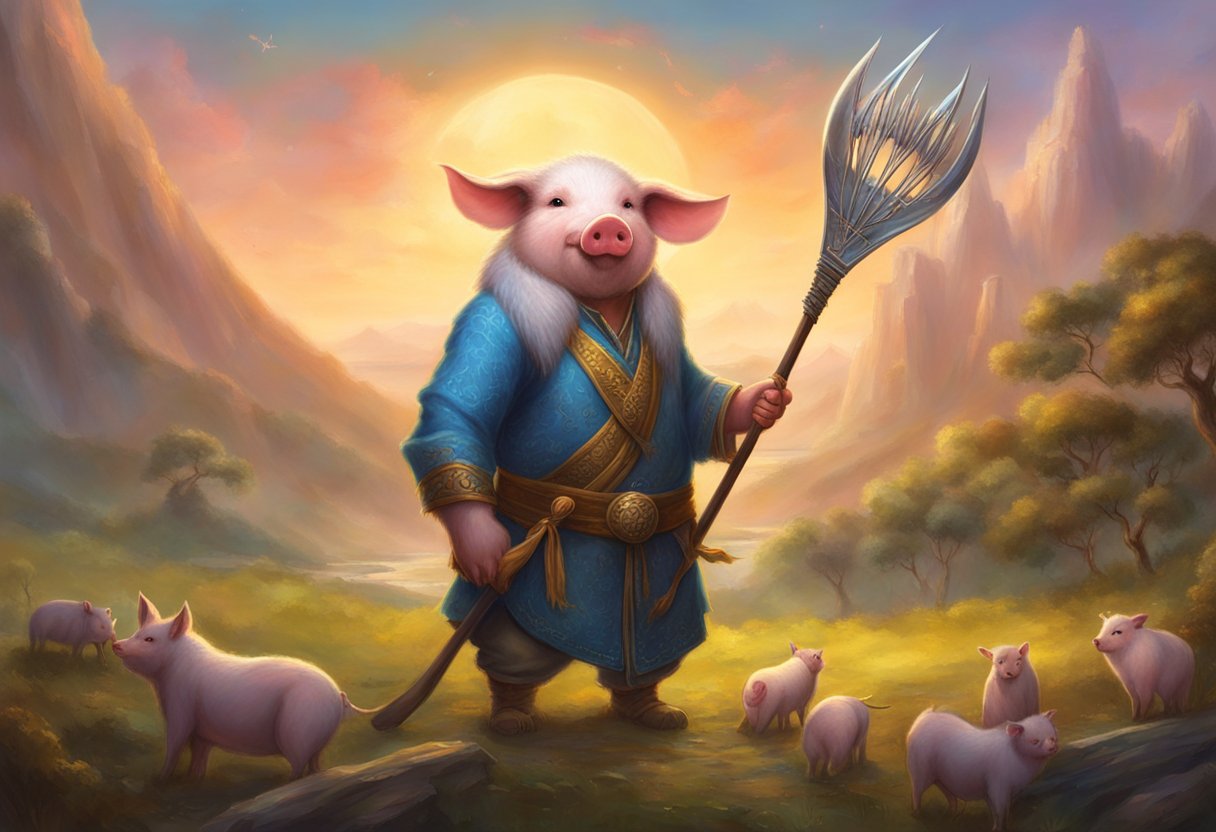
In the novel, Zhu Bajie is depicted as a former celestial marshal who was banished to earth for flirting with the moon goddess. He later becomes a disciple of Tang Sanzang and helps him on his journey by using his strength and fighting abilities to protect the group from demons and other dangers. Despite his flaws, Zhu Bajie is a loyal friend to his fellow disciples and is willing to risk his life to protect them.
Zhu Bajie’s character has become a popular figure in Chinese culture and has been adapted into various forms of media, including TV shows, movies, and video games. His story has also been studied by scholars for its religious and philosophical themes, such as the concept of redemption and the struggle between good and evil.
Literary Origin
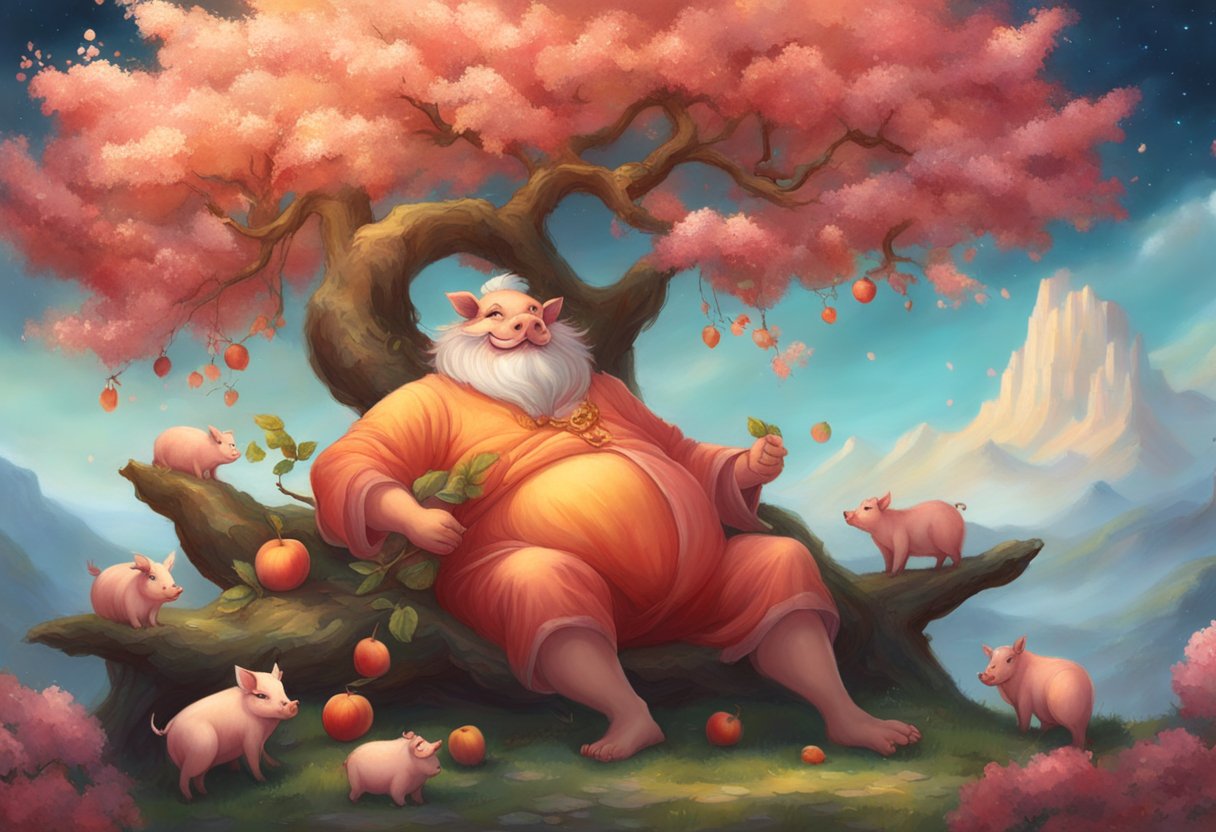
Journey to the West
Zhu Bajie is a fictional character in the classic Chinese novel “Journey to the West.” The novel was published in the 16th century during the Ming dynasty and is attributed to Wu Cheng’en. It is one of the greatest classic Chinese novels and has been described as arguably the most popular literary work in East Asia.
Authorship
The authorship of “Journey to the West” is attributed to Wu Cheng’en, a Chinese novelist and poet of the Ming dynasty. However, the novel was likely a collaborative effort, with contributions from several authors and editors over the course of several centuries.
Character Inspiration
Zhu Bajie is based on the character Zhu Wu, a figure from Chinese mythology. Zhu Wu was a general in the army of the Shang dynasty who was transformed into a pig as punishment for his gluttony. In “Journey to the West,” Zhu Bajie is a former marshal of the Heavenly Court who was banished to the mortal realm for his misbehavior. He is depicted as a gluttonous and lustful pig-man who accompanies the monk Tang Sanzang on his journey to India to retrieve Buddhist scriptures.
Character Profile
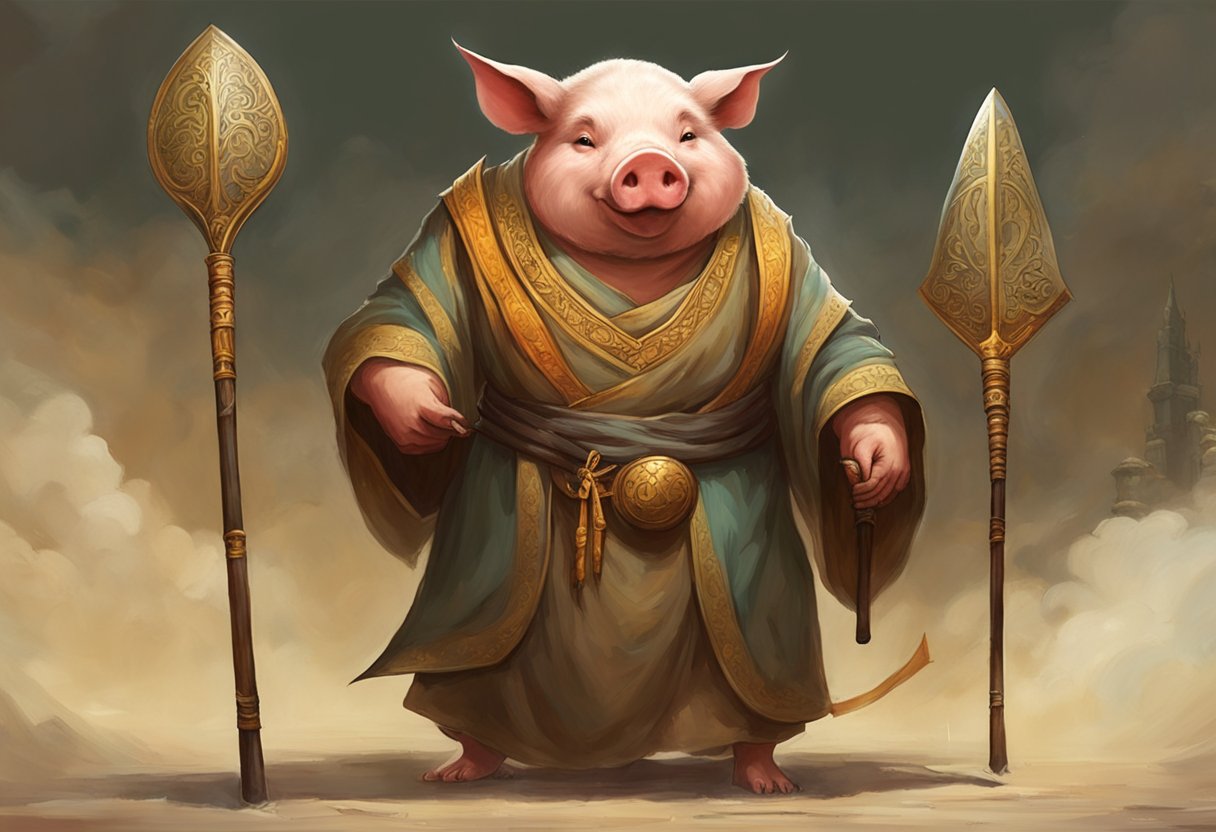
Physical Description
Zhu Bajie is a humanoid-pig monster, part human and part pig. He has pink skin, big ears, a short snout, and a large stomach. He is often seen carrying a metal rake, which he uses as a weapon.
Personality Traits
Zhu Bajie is known for his laziness, gluttony, and propensity for lusting after pretty women. He is often jealous of Sun Wukong, one of his companions, and tries to bring him down. Despite his flaws, he is a loyal companion and is willing to risk his life to protect his friends.
Powers and Abilities
Zhu Bajie possesses superhuman strength and endurance, which he uses to fight off demons and other enemies. He is also able to transform into different animals, including a dragon, a fish, and a bird. However, he is not as skilled in martial arts as some of his companions and often relies on brute force to win battles.
Role in the Novel
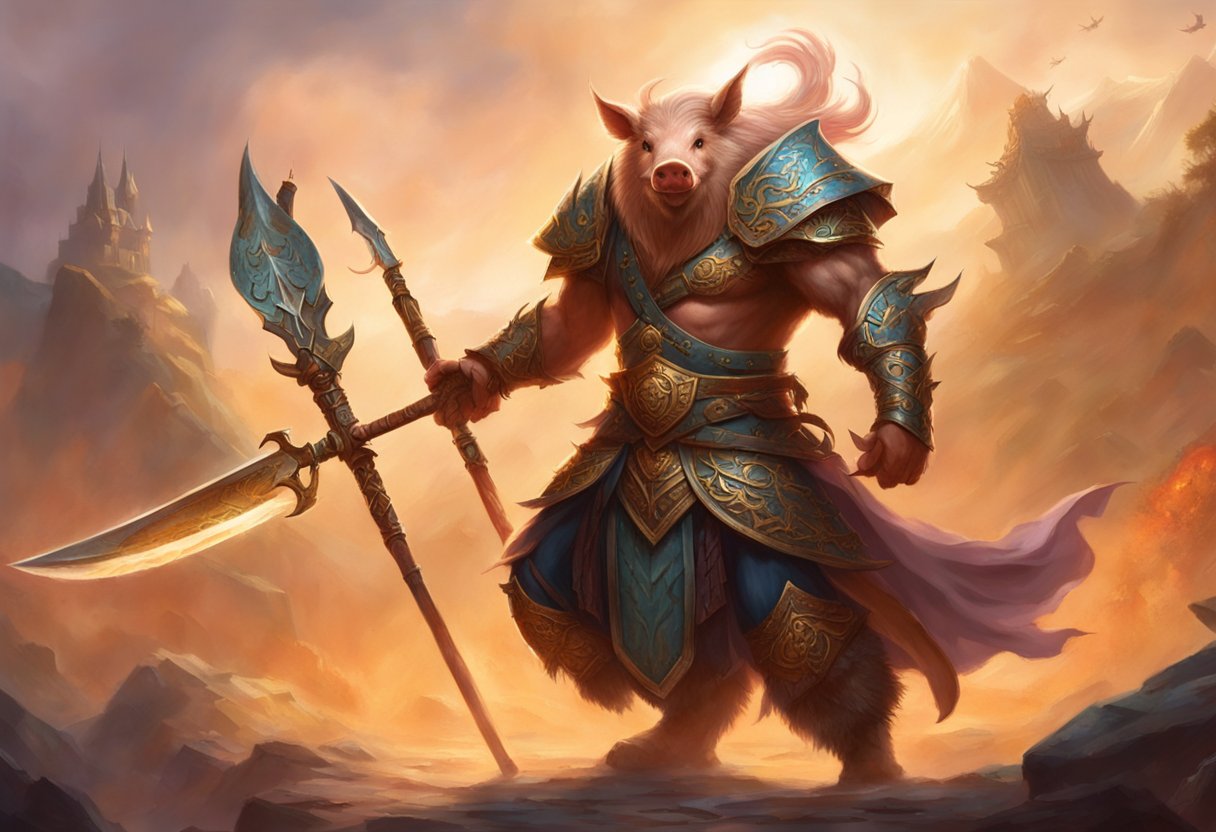
Pilgrimage Contributions
Zhu Bajie, also known as Pigsy, is one of the main characters in the Chinese novel “Journey to the West”. He is a former celestial marshal who was banished to the mortal world and became a half-human, half-pig monster. Along with Sun Wukong, Tang Sanzang, and Sha Wujing, he embarks on a pilgrimage to retrieve Buddhist scriptures from India. Despite his flaws, Pigsy contributes greatly to the journey by using his strength and cunning to overcome obstacles and defeat demons.
Interactions with Other Characters
Pigsy’s personality is characterized by his gluttony, laziness, and lecherousness. He often gets into trouble with his companions due to his vices, but he also provides comic relief and lightens the mood during their arduous journey. Pigsy has a close relationship with Tang Sanzang, whom he respects as his master, and he is also protective of his fellow disciples. However, he has a strained relationship with Sun Wukong, who often belittles him and calls him names.
Key Events and Trials
Throughout the novel, Pigsy faces many trials and tribulations, both physical and emotional. He is often tempted by beautiful women and delicious food, which leads him into danger. He also encounters powerful demons who test his resolve and strength. One notable event is when Pigsy is captured by the spider demoness and forced to marry her. He is eventually rescued by his companions, but not before undergoing a transformation that makes him more serious and disciplined. Overall, Pigsy’s role in the novel is essential to the success of the pilgrimage, and his character arc is one of growth and redemption.
Cultural Impact
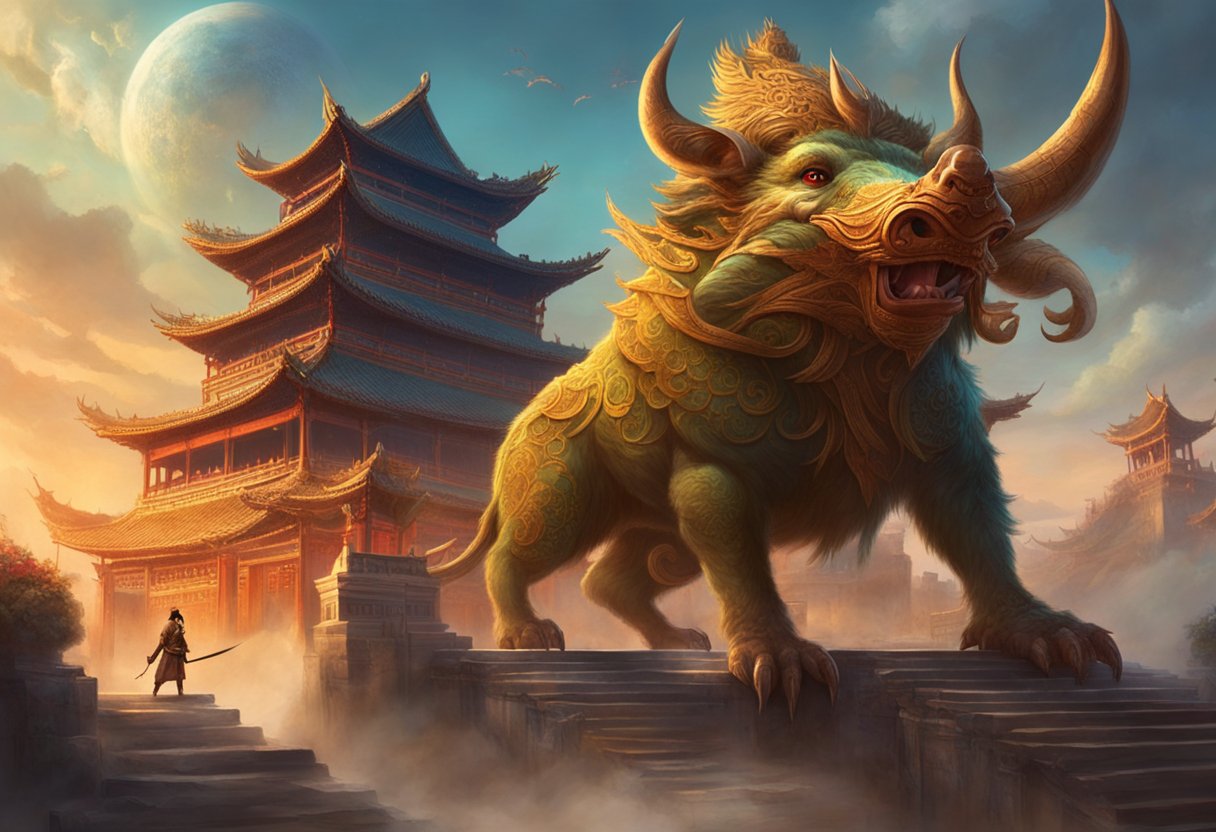
Adaptations in Media
Zhu Bajie, also known as Pigsy, has been a popular character in Chinese literature and media for centuries. He has appeared in numerous adaptations of the classic Chinese novel Journey to the West, including television shows, movies, and video games. In these adaptations, he is often portrayed as a comical and lovable character, with his gluttony and lust for women providing a source of humor.
Religious and Folkloric Significance
In addition to his appearances in popular media, Zhu Bajie has significant religious and folkloric significance in Chinese culture. He is often worshipped as a deity, particularly among those who work in the food and hospitality industries. His association with food and drink has led to him being seen as a patron saint of chefs and bartenders, and his reputation as a protector of travelers has made him a popular figure among those who work in the transportation industry.
Modern Interpretations
In recent years, Zhu Bajie has been reinterpreted in modern contexts. For example, in Taiwan, he has become associated with the sex industry, with masseuses and sex workers often worshipping him as a patron saint. Additionally, his image has been used in advertising campaigns for food and drink products, such as beer and instant noodles. Despite these modern reinterpretations, however, Zhu Bajie remains an enduring figure in Chinese culture, with his popularity showing no signs of waning.
Symbolism and Themes
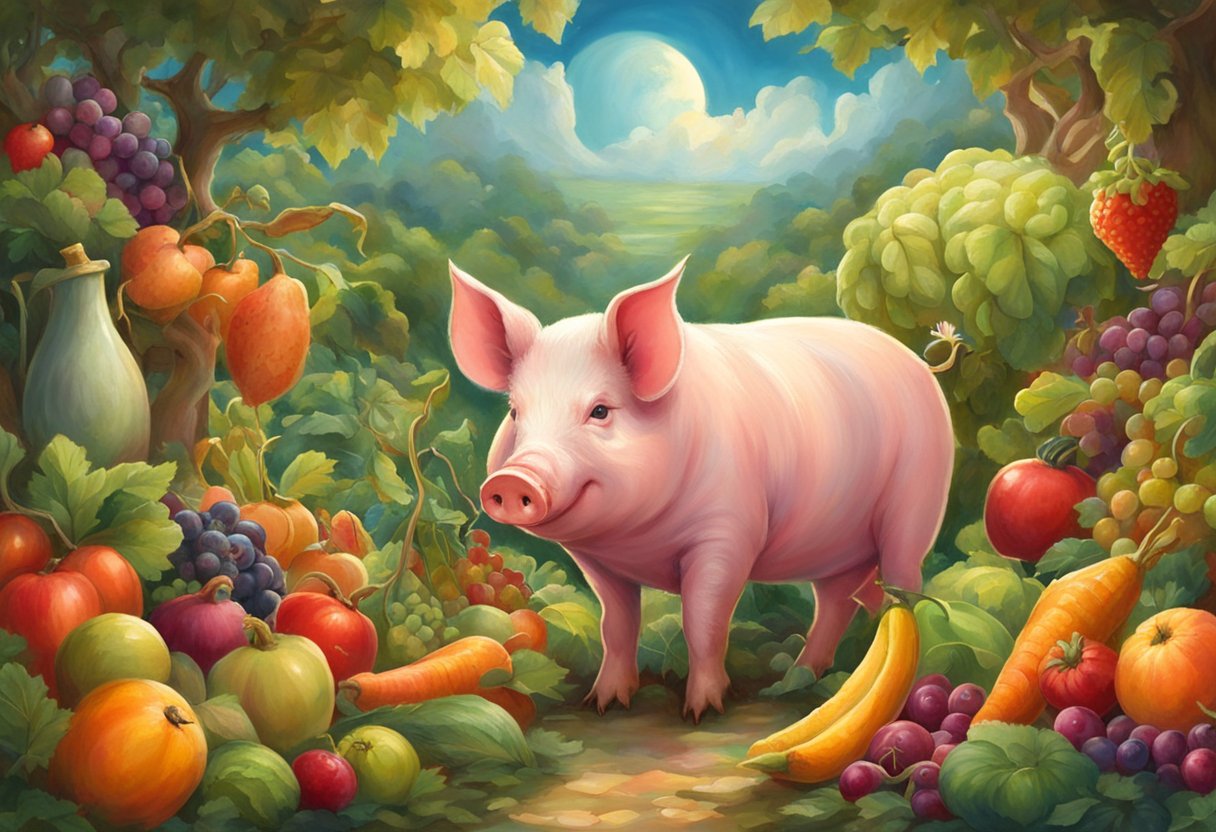
Transformation and Redemption
Zhu Bajie’s character is a representation of transformation and redemption. He was once a heavenly marshal who was banished to earth and transformed into a half-human, half-pig creature as a punishment for his misdeeds. However, he proved himself to be a valuable member of the journey to the west, and through his loyalty and bravery, he was able to redeem himself and earn forgiveness for his past mistakes.
Loyalty and Brotherhood
Loyalty and brotherhood are also important themes in Zhu Bajie’s character. Despite his flaws and comical nature, he remains loyal to his companions and is always willing to put himself in harm’s way to protect them. He forms a strong bond with Sun Wukong and Tang Sanzang, and the three of them become a formidable team that overcomes many obstacles together.
Comedic Relief
Zhu Bajie’s character also serves as a source of comedic relief throughout the story. His gluttony, laziness, and lustful nature often lead to humorous situations that provide a break from the more serious and intense moments of the journey. His comical antics also serve to humanize the characters and make them more relatable to the readers.
In summary, Zhu Bajie’s character represents transformation, redemption, loyalty, and brotherhood. He also provides comedic relief to the story and serves as a reminder that even flawed characters can become heroes through their actions and choices.
